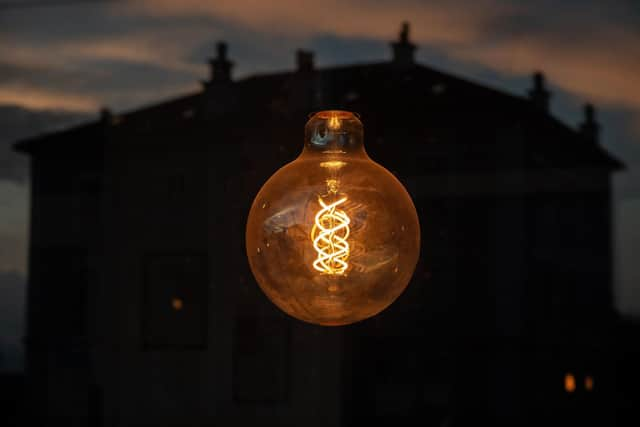Will the lights go out across Scotland this winter?
Given the nation’s emerging role as a renewable energy powerhouse, the prospect may strike many as unthinkable, but the reality is that Scotland, like the rest of the UK, could see electricity rationing.
Those responsible for delivering a stable energy supply are already preparing for such an outcome. On the morning of 13 September, the National Grid will begin a series of emergency simulations designed to test the national response to a series of supply losses.
Advertisement
Hide AdAdvertisement
Hide AdA slew of public and private bodies across Scotland, including the North Sea Transition Authority and Shell’s St Fergus gas plant near Peterhead, will be taking part in the simulations, known as Exercise Degree.
Ordinarily, the wargaming scenarios last two days, but the potential crisis facing the country means that this year, Degree will span four days so as to test multiple scenarios. It is understood stress tests are also being carried out on a website being prepared to advise the public of any energy shortages.
On the one hand, such steps are precautionary, but Russia’s midweek move to temporarily cut off gas supplies to Europe via the the Nord Stream 1 pipeline has intensified anxieties. Experts believe that the prospect of rota disconnections, which involves limiting or cutting power customers on a rotational basis, is not far-fetched.
“A credible scenario for the coming winter is players in the GB gas wholesale market failing to procure enough gas quickly enough,” explained Keith Bell, professor of electronic and electrical engineering at the University of Strathclyde
“Safety of the gas system is paramount and pressures in the gas network must be maintained. If there is not enough supply, demand for gas must be reduced. This can be done most safely by cutting supplies to large industrial users or exports to other countries. Similarly, if we’re importing gas from a country that has an emergency, they might cut exports to us.


“One of the large industrial users that could be cut is power stations, which may lead to shortages of electricity. The emergency code then allows for the secretary of state to authorise rota disconnections of electricity demand.”
Many will wonder how such a worst-case scenario could come to pass. After all, Scotland generated around 50,000 terawatt hours (TWh) of electricity a year, more than half of which - 27.2 TWh in 2021 - came from renewable sources. The latter figure alone is the equivalent of enough power to supply every household in Scotland for almost three years.
Indeed, Scotland actually produces more energy than it uses, allowing it to export close to 17.7 TWh of electricity a year, with all but a tiny amount going to England. The estimated wholesale value of that market is nearly £2.4 billion.


Advertisement
Hide AdAdvertisement
Hide AdBut while Scotland’s renewable generation boom is impressive, it still does not guarantee a reliable electricity supply due to a lack of energy storage capacity. Other sources are required.
Much has been made of how Scotland is close to generating the equivalent of 100 per cent of its electricity demand from renewables; as of 2020, the proportion stood at 98.6 per cent. Impressive? Undoubtedly. But meeting demand is not the same as meeting consumption.
In fact, just 41.3 per cent of the electricity consumed in Scotland last year came from wind power sources. Once other green sources - hydro, solar, and bioenergy and waste - are taken into account, the figure reached 51.6 per cent.
The proportion of consumption made up by renewables has actually fallen in recent years; in 2020, green sources accounted for 55.7 per cent of the electricity used. The fall has been attributed to milder, less windy weather last year. Such inconsistencies, say experts, are a longstanding problem.
“As things stand, Scotland is not capable of securely meeting its demand for electricity, because the wind and solar resources vary so much,” Prof Bell said. “Wind and solar are variable so cannot be relied on to meet demand, which also varies minute by minute all the time.
“When it’s windy, the available power often exceeds demand within Scotland. The surplus is exported to England and Northern Ireland. When it’s not windy, we need to meet the deficit by importing from England.”
Indeed, while Scotland remains a net exporter of electricity, the amount it imports has also risen sharply in recent years, up from just 201 gigawatt hours (GWh) in 2014 to 1,644 GWh in 2021. The milder weather is one factor in that, but other drivers - such as the closure of the coal-fired power station at Longannet - have also contributed.
So can the Scottish Government take any meaningful steps to avoid potential blackouts, and can energy generated here be diverted for that purpose?
Advertisement
Hide AdAdvertisement
Hide AdThe short answer is no. The long answer is inextricably bound up in constitutional politics and what is known as the British Electricity Trading and Transmission Agreements (BETTA), a single wholesale electricity market covering Scotland, England, and Wales.
The arrangement means that unless there is sufficient generation adequacy across the entire ‘GB power system’, there can be no guaranteed electricity supply in Scotland. And given energy policy is mainly reserved to Westminster, the Scottish Government lacks the constitutional or legal power to control the complete mix of energy production.
That does not mean the administration at Edinburgh lacks the ability to broker longer-term solutions. David Jenkins, professor energy and buildings at Heriot-Watt University, points out that the Scottish Government has a “degree of control” over energy efficiency policies around buildings, industry, and transport.
“It could, longer term, lessen the risk of households and businesses experiencing future blackouts, even if the rest of the UK chooses not to do so,” he explained. “And the Scottish Government has previously introduced energy efficiency programmes that are, by some definition, more ambitious than Westminster.”
Comments
Want to join the conversation? Please or to comment on this article.
